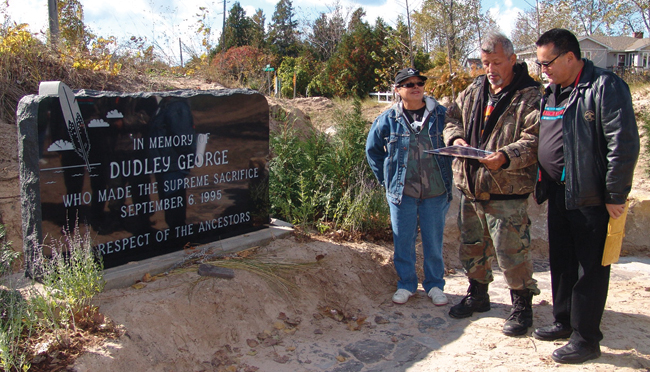IPPERWASH SERIES: Seven years on, still no treaty implementation mechanism in Ontario

The Labour Day long-weekend marked 19 years since the reclamation of Ipperwash Provincial Park, part of Aazhoodena (Stoney Point) ancestral lands. What began as a peaceful demonstration – not unlike numerous other struggles for Indigenous lands across Canada – ended in the shooting death of unarmed Dudley George by an Ontario Provincial Police sniper. This was the first killing of an Indigenous person in a land-rights dispute in Canada since the 19th century.
Respecting the spirit of resistance and resolve embodied by Dudley, this series of articles takes a critical look at post-Ipperwash Ontario.
By Nicole Latulippe
The single biggest source of frustration, distrust, and ill-feeling among aboriginal people in Ontario is our failure to deal in a just and expeditious way with breaches of treaty … If the governments of Ontario and Canada want to avoid future confrontations like Ipperwash or Caledonia, they will have to deal with land and treaty claims effectively and fairly. (Report of the Ipperwash Inquiry 2007, Executive Summary, pg 81)
To avoid violence in similar circumstances, the number one recommendation made in volume 2 of the Report of the Ipperwash Inquiry was for the establishment of a Treaty Commission in Ontario (TCO). A permanent, independent and impartial body would facilitate and oversee the settling of land and treaty claims in Ontario in a spirit of fairness and expediency.
The cornerstone of the Report’s recommendations, the creation of a TCO would generate the conditions necessary for the implementation of subsequent recommendations.
It would provide a much-needed mechanism for treaty partners to relate on a nation-to-nation basis. Currently, the First Nations-Crown relationship is plagued by divergent treaty interpretations: the province of Ontario holds that historic treaties extinguish Indigenous claims to lands and resources, whereas, from a First Nations perspective, treaties are about sharing the land. In this context, there is no mechanism to address grievances outside of narrow state negotiation frameworks or costly litigation. A TCO could address this gap.
With a mandate including public education, an independent and impartial TCO would provide a balanced perspective on the treaty relationship and amplify growing awareness that all peoples are beneficiaries of the treaties in Ontario, that we are all treaty people.
The Report of the Ipperwash Inquiry was release in 2007. Seven years on, there is still no TCO.
Seven years to the month, the most recent report by United Nation on the situation of Indigenous peoples was released. In May of this year, James Anaya, Special Rapporteur on the rights of indigenous peoples, deplored Canada for its poor implementation of existing rights and treaties.
Sadly, the message is all too familiar.
Since the last visit by the UN in 2004 – the same year evidentiary hearings began on the events surrounding the death of Dudley George – Anaya reports that relations between the Crown and its former First Nations allies have deteriorated. Treaty and aboriginal claims remain persistently unresolved and there is a high level of distrust among indigenous peoples toward government at both federal and provincial levels.
Meanwhile, it took less than one month following the release of the Ipperwash report for the new Ontario Ministry of Aboriginal Affairs (MAA) to be created. Indeed, Linden recognized that a stand-alone Ministry was needed. However, this need was preceded by 31 recommendations. Minimal if any progress has been achieved in those priority areas, including provisions for a TCO; the duty to consult and accommodate; resource revenue sharing and resource co-management; the protection of Indigenous heritage and burial sites; and public education on First Nations perspectives.
A post-Ipperwash Ministry of Aboriginal Affairs has committed to forging stronger relationships with First Nations and to foster their meaningful participation in decision-making. Yet, in 2011, the Ontario Federation of Labour reported that conditions were set for another Ipperwash in the making, this time in Northwestern Ontario. In spite of a moratorium on development and calls on the province to intervene, Ontario failed to halt mineral exploration taking place on sacred burial grounds belonging to Kitchenuhmaykoosib Inninuwug (KI). A long-standing conflict, Linden cited previous incidents at KI and the Platinex case in order to highlight Ontario’s chronic disregard for First Nations land rights and failure to protect sacred burial grounds, and to underscore the right of First Nations to participate in the management of their lands and natural resources.
So, it appears that the provincial government has balked at the implementation of recommendations that challenge established beliefs that Indigenous lands are anything but Open for Business, colonial residue that a TCO would help to correct.
The Ipperwash report recommended that a TCO be established and operate through a tripartite process, one that includes First Nations, Canada and Ontario. More recently, the UN has called on Canada to assign a higher priority to its relationship with Indigenous peoples, and to build real partnerships based on mutual understanding and full respect for constitutional, treaty, and internationally-recognized Indigenous rights.
Canada remains estranged from discussions on the establishment of a Treaty Commission in Ontario, and First Nations remain locked in a revolving door of crisis-report-crisis, and repeat.
To learn more about the events surrounding Ipperwash Park, visit http://www.anishinabek.ca/ipperwash.asp
Nicole Latulippe is a PhD Candidate in the Department of Geography at the University of Toronto. In partnership with Nipissing First Nation, her dissertation research is on the Lake Nipissing fishery, Indigenous knowledge and governance systems, and the treaty relationship. Formerly, she worked with the Union of Ontario Indians on the Ipperwash implementation process.


